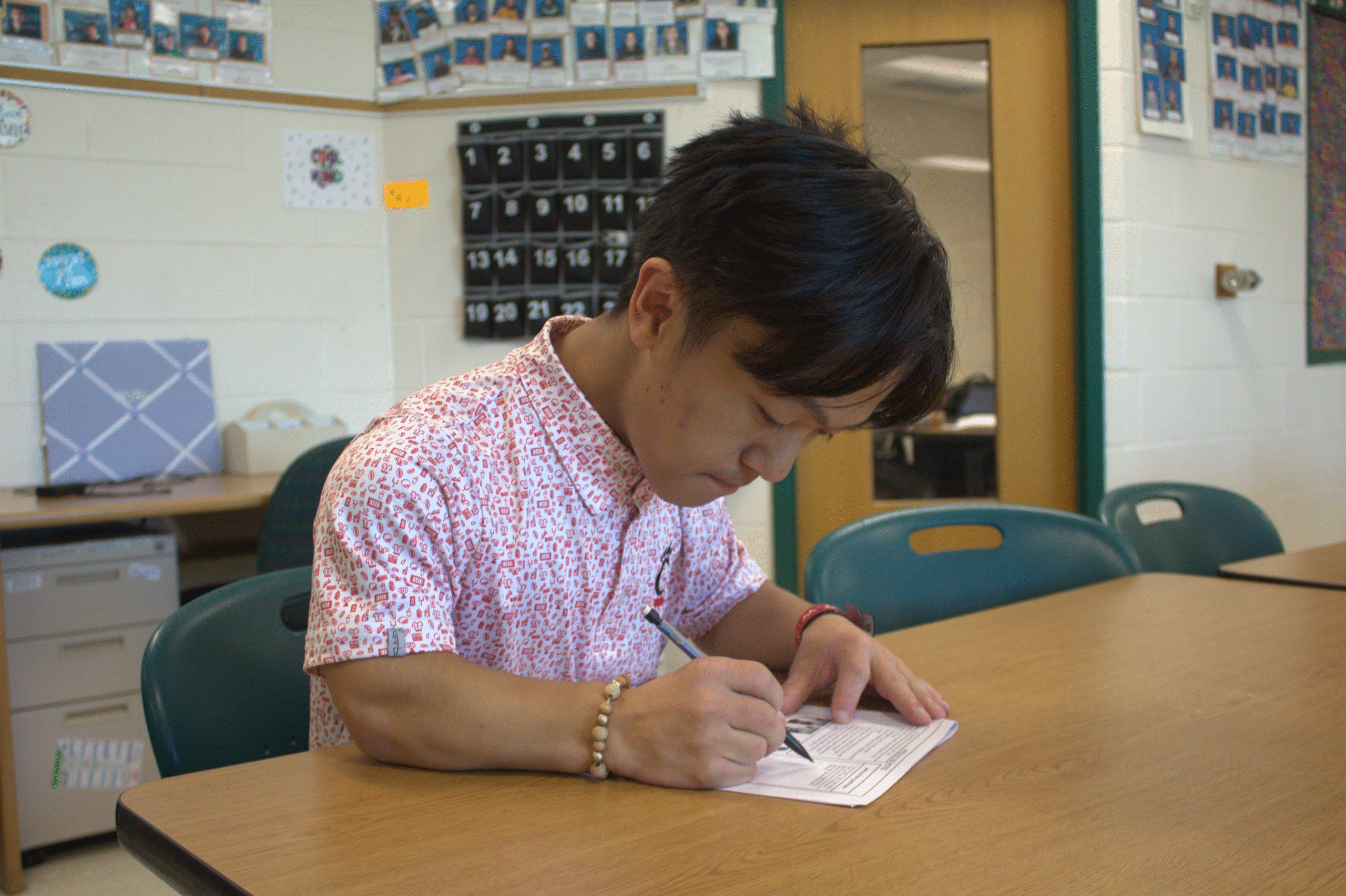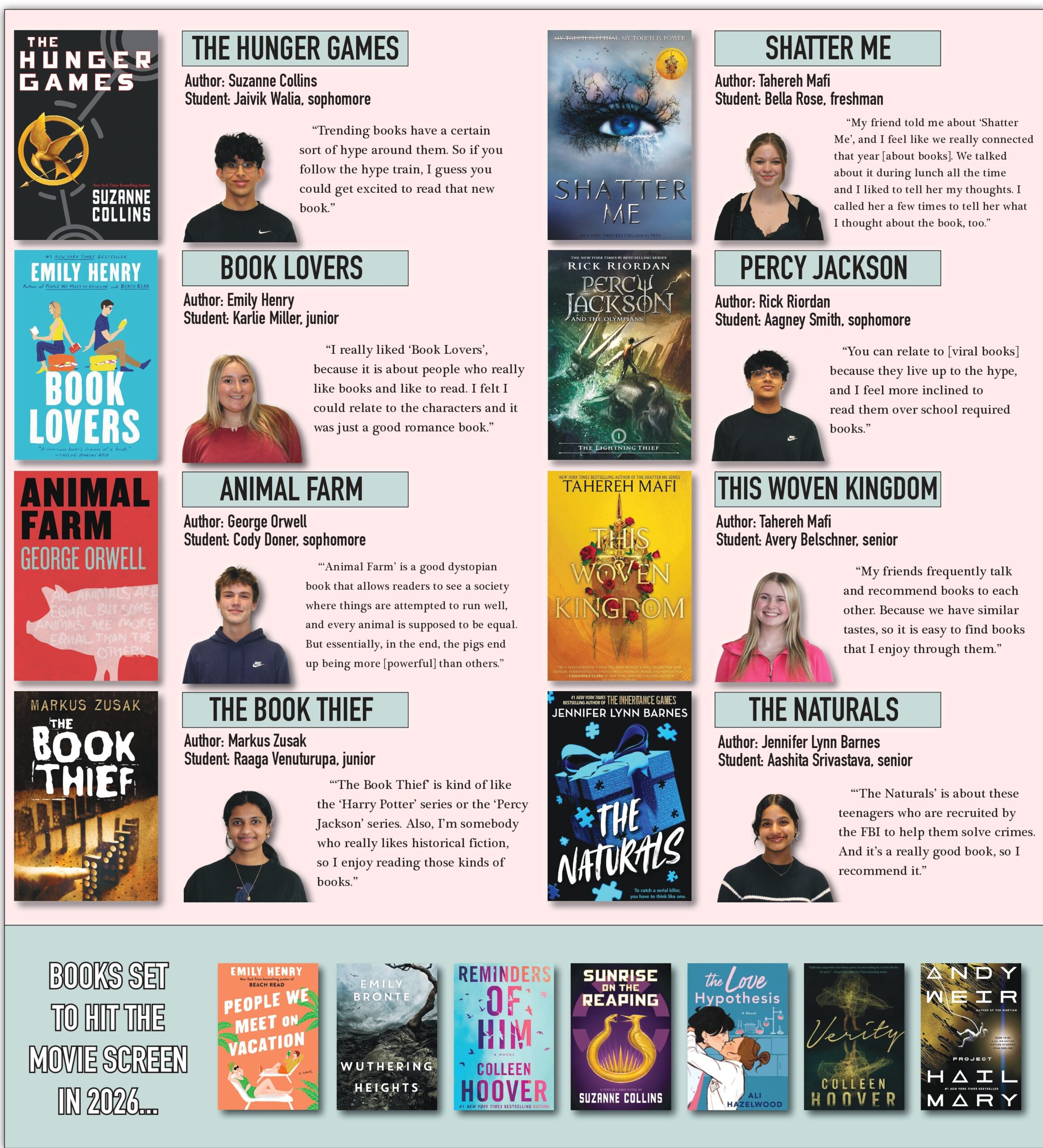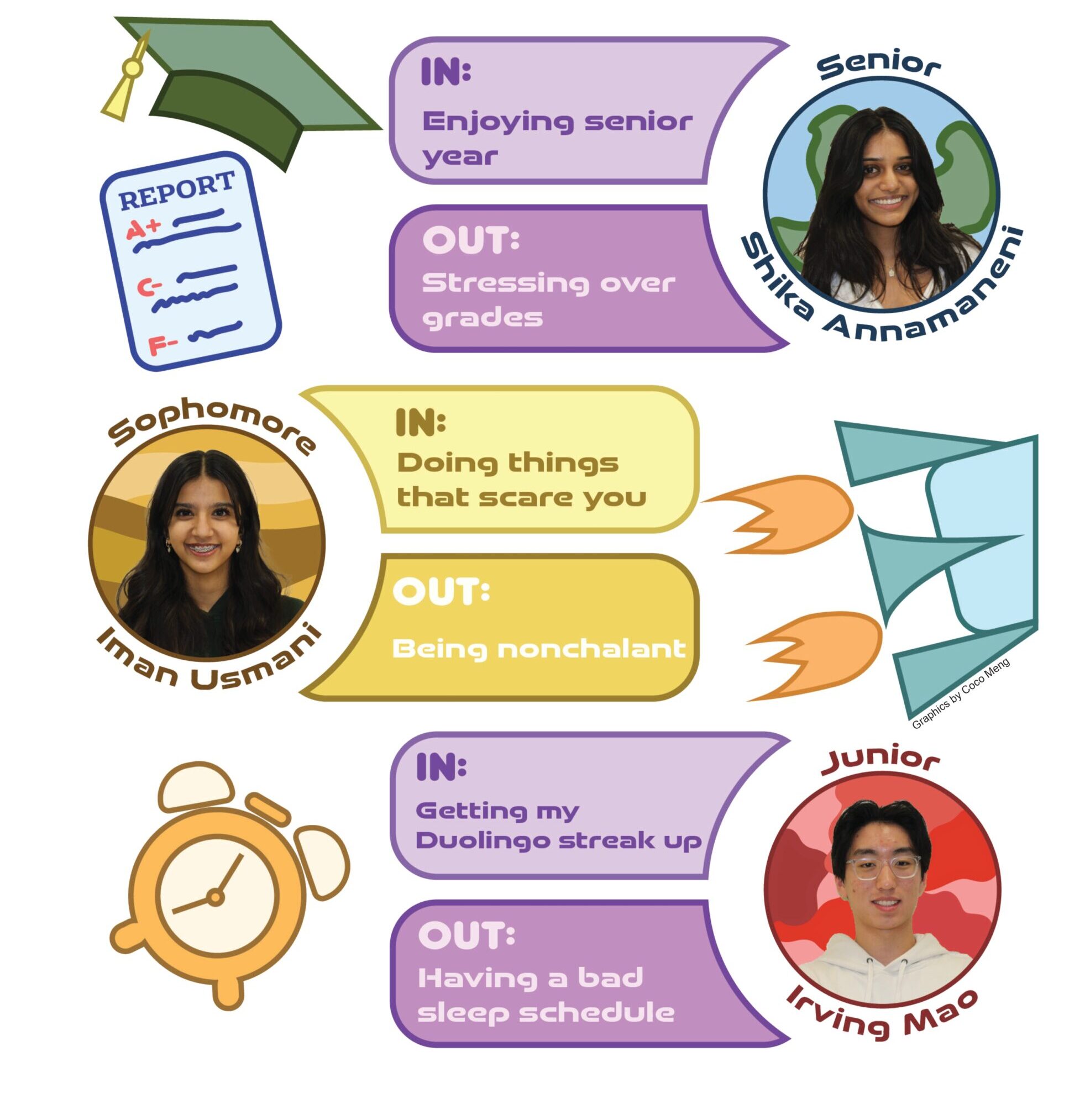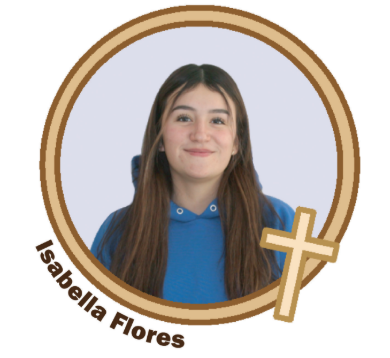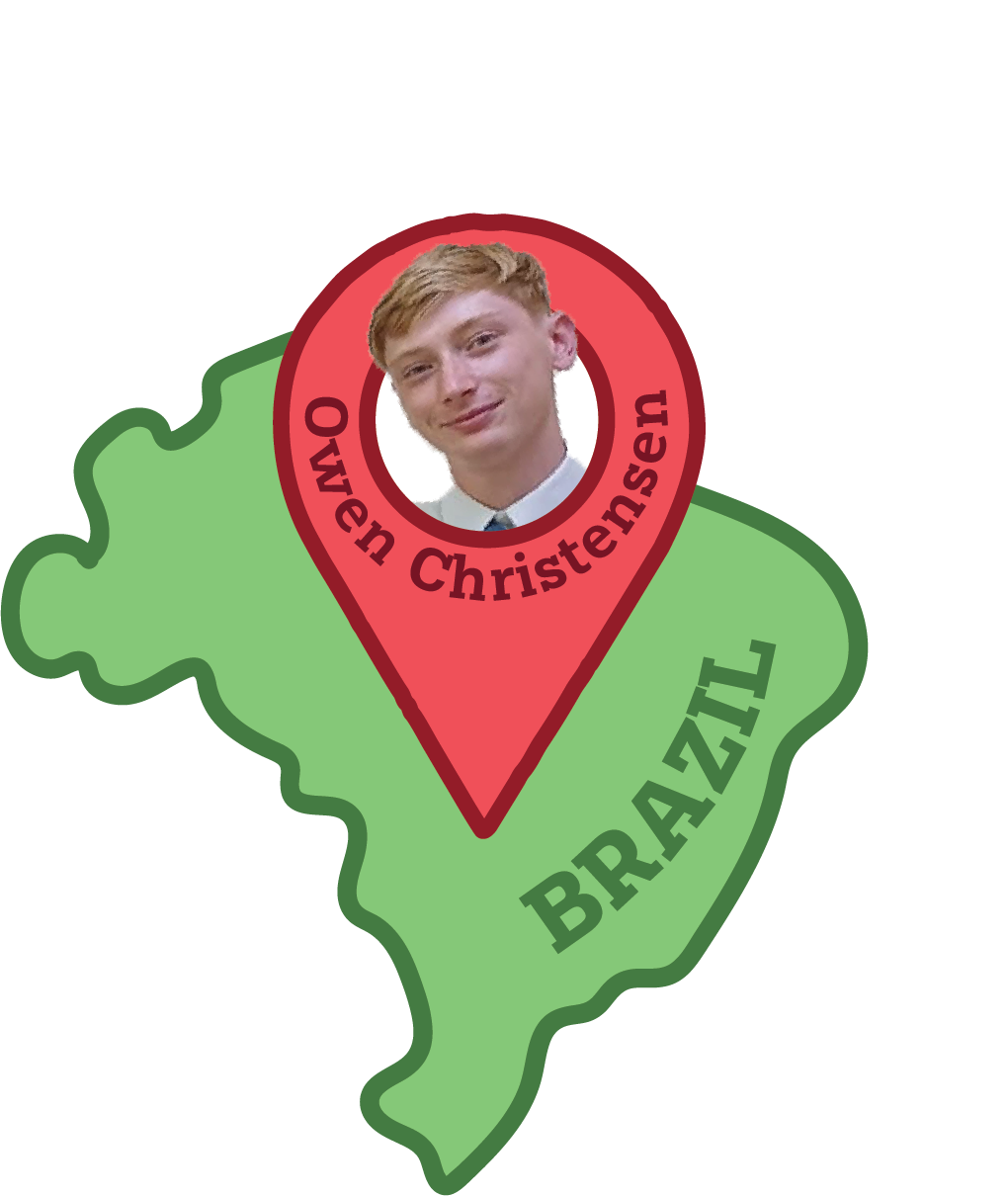Katie Samol | The Chronicle
Elijah Ayers is like any high school senior. He plays soccer, enjoys video games and hopes to attend the University of Cincinnati for business next fall. But his experience as a Mason High School (MHS) student stands apart from the rest.
Standing at 4 feet 3 inches, Elijah has a form of dwarfism called achondroplasia. Born and raised in Nanyang, China, Elijah was adopted at age seven by Kara and Adam Ayers. Both parents have osteogenesis imperfecta, a genetic disorder that causes bones to break more easily. Kara and Adam use wheelchairs and identify as little people.
“I was in China, living in a not-so-good place,” Elijah said. “I didn’t know who my real parents were because they put me in the [orphanage] when I was 18 months old. I know some people are afraid sometimes of these words like orphanage. There is some bad history behind it, but for me, I just see it as a lot of trauma that happened in the past.”
Before adopting Elijah, Kara and Adam already had their daughter, Hannah Ayers. Kara said they wanted Hannah to have a sibling, but did not know if they would have another child biologically, leading them to consider adoption.
“We really felt that we could raise a child with a disability with the supports that they need,” Kara said. “Both advocating for supports they need in school and at home, but more so raising them to be proud of who they are, including their disability. Then we specifically found Eli, and then worked to adopt him.”
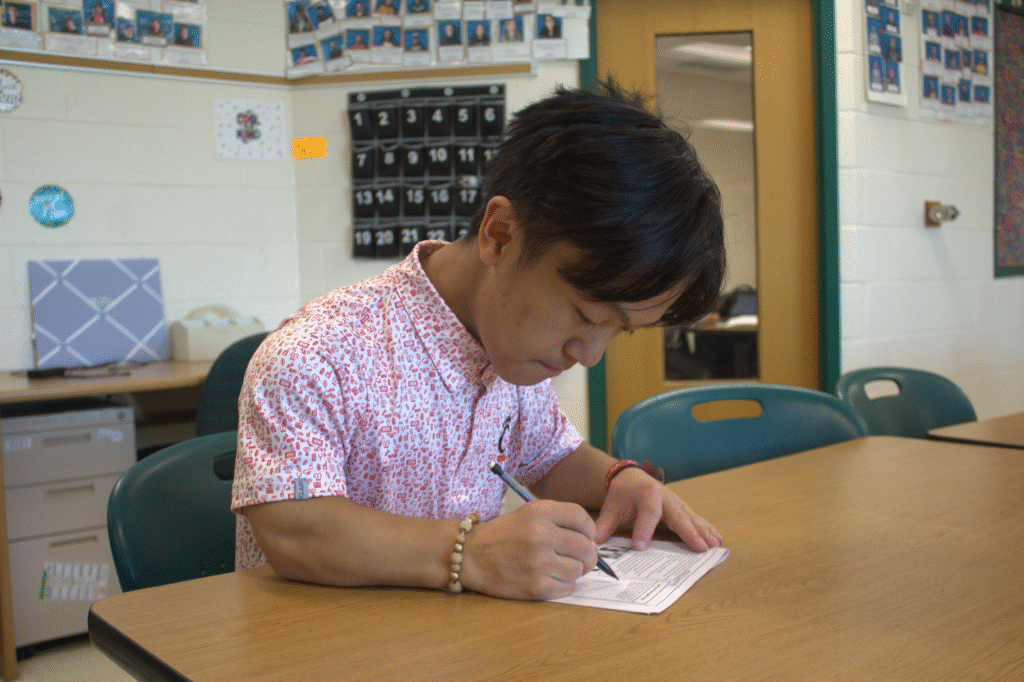
Elijah Ayers focuses on completing AP Psychology homework in his Study Skills classroom.
In China, he had limited access to areas outside of the orphanage, but coming to the United States allowed him to explore new places and gain new experiences. Elijah said it was a dream come true to come to the United States.
“Getting to fulfill the American dream, becoming free and having a supportive family that I get to live with [is] amazing, because I didn’t get to live with that,” Elijah said. “I lived in a place where a lot of us didn’t have families, but we treated each other like a family. Being here, it was more like a real family.”
Elijah began noticing differences between him and his classmates when they reached puberty, realizing he was growing at a slower rate.
“I got self-conscious, and [I] got anxiety and depression,” Elijah said. “I saw people [growing] way faster than I was, [but] I didn’t see that as a disappointment for myself. I saw that as “That’s cool that you’re growing in your own way. I’m growing in my own way, but it’s slower and I’m fine with it.’”
As a Christian, Elijah turned to religion in his youth to pray for changes, knowing certain wishes he made were not genetically possible. Looking back, Elijah said he now understands what needed to shift.
“I [believed] that if I could be someone different, or just be a little bit taller, then I wouldn’t feel this anxiety as much,” Elijah said. “But coming here to this safe space, knowing that I have a safe family, I started to realize that I don’t need to wish on being taller. I just [needed] to wish that I [was] myself.”
While Elijah faces both social and physical challenges regularly due to his dwarfism, he said the social difficulty is more prevalent in his life.
“On a day-to-day basis, I face a lot of backlash,” Elijah said. “[Being] looked at, laughed at, whispering about me, people excluding me from things [or] seeing me as this odd object.”
Most of the comments and criticism Elijah receives are from younger kids. He said they are curious, and many have not been exposed to people of short stature before.
“They live in a normal height society; they don’t know that there are other people,” Elijah said. “Older [kids] come to realize that this is a diverse community, and there’s no need for laughing, pointing [or] staring.”
People sometimes use offensive terms when they are not sure how to refer to little people, which Elijah has encountered.
“I know that a lot of times people want to use the M word, and I just want to be clear that it is an offensive word,” Elijah said. “I don’t hear it as much here because [Mason] is a really welcome and diverse space, but when I was eight or 10, I got exposed to that word.”
Elijah said he was naive and did not know what the word meant. After a conversation with his dad about the word’s connotation, he began to advocate for himself more strongly.
“If someone said that, I would stand up, tell them that’s a bad word, and tell them why,” Elijah said. “I would like to be called a little person.”
Like Elijah, Kara identifies as a little person and said the word’s use can sometimes be a chance to educate.
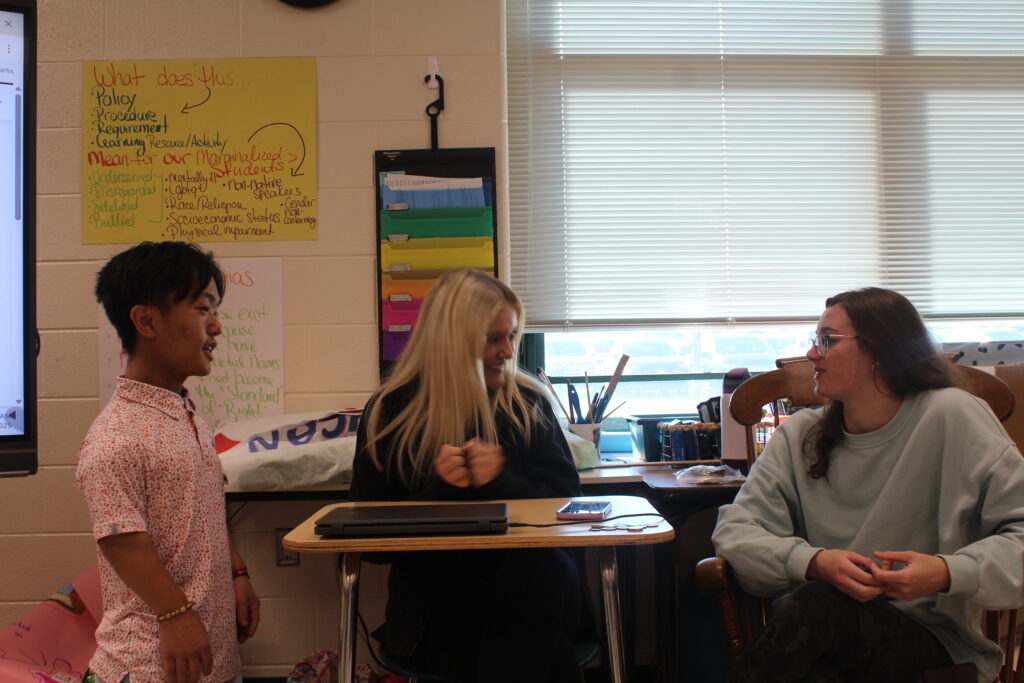
(Left to right) Elijah Ayers, Madison Evers and Dana Fairbanks discuss schoolwork and projects together in the Teacher Academy classroom.
“I think some people genuinely don’t know that word is a hurtful slur,” Kara said. “A lot of times, if people don’t know that, you can educate them and let them know.”
Kara said that while some people apologize when corrected, others know the word is offensive and use it anyway. While those moments can be difficult, Kara said she tries to instill resilience in Elijah.
“Eli used to shoot basketballs out in our front yard when he was younger and unfortunately, more than once, people would drive by and yell midget, which is pretty terrible,” Kara said. “To yell any name at a person, but especially a kid. Sometimes we don’t really have a chance to respond, and how we respond is [by] building each other up.”
Elijah’s friends and family said he is a very outgoing and friendly person. Despite this, Elijah said he thinks people are scared to talk to him one-on-one.
“A lot of people talk about how I’m such a good person to talk to,” Elijah said. “I’m proud of myself for that, but with those achievements comes the cost of experiencing this backlash of hate and people excluding me.”
Although he may replay a situation and analyze how he could have responded differently, Elijah said he works to move on. He said he tries not to give the criticism power, shifting his attention to the more important things in his life.
“I love the quote ‘keep moving forward,’” Elijah said. “No matter how difficult the situation, just keep moving forward, always with [your] head up, smiling.”
Kara said she has witnessed first-hand the persistence Elijah shows, continuing to move forward no matter the obstacle thrown his way.
“He has faced a lot of challenges in his life, including coming to a whole new country with a whole new family at seven,” Kara said. “I think a lot of people would have been really afraid, and he has tackled everything with enthusiasm and an open mind. He’s faced a lot of hard things, and he just keeps getting up and doing it again. Sometimes those hard things are people. Unfortunately, there’s still a lot of stigma in our society about dwarfism, and Eli faces that with bravery and keeps working towards his goals.”
Elijah and his family have found support within a convention called Little People of America (LPA), which is a nonprofit organization that provides opportunities to connect with other little people. The Ayers family attended an LPA conference in Orlando, Florida, from October 9 to October 12 this year.
“Little People of America is a conference where a lot of people like me who have dwarfism meet up once a year,” Elijah said. “We do normal things. Socialize, play sports, make friends—that’s pretty much how we make friends with [other little people].”
The Ayers family has been involved in LPA for years, with Elijah having attended conferences since 2018. Beyond LPA, Elijah and his dad, Adam, said they enjoy their involvement with the Dwarfism Athletic Association of America (DAAA), an organization that provides competitive sporting opportunities to athletes with dwarfism.
“Joining that community together, it just feels like it’s my home,” Elijah said. “It’s where people like me get to be with people that are like them too, and get to express the same thing about their experiences. Being with those friends who were in that conference, we’re just so similar. We’re the same height, and we have the same problems and the same day-to-day challenges.”

A senior at Mason High School, Elijah Ayers has attended Little People of America conferences since 2018 and participates in sports through
the Dwarfism Athletic Association of America.
From Kara’s perspective, LPA offers a break from some of the challenges that are a part of the Ayers family’s everyday life, allowing them to instead connect with other little people.
“It’s a good opportunity for a couple of weekends a year to be around other people like you, and to not have to answer questions or explain yourself,” Kara said. “Sometimes that happens in everyday life for Eli and for me, but what I’ve learned from parenting Eli is that society treats his disability differently. For Eli, our society sometimes is a lot more rude and ableist.”
Kara is an associate professor at Cincinnati Children’s Hospital and the University of Cincinnati, holding a PhD in Clinical Psychology, researching, teaching and working on policy matters related to disability. Elijah said the work that his mom does is an inspiration.
“I get to learn with her how I can accept myself and how I can advocate for other people to accept themself,” Elijah said. “Having parents that have a disability, I can learn from what they experienced when they were my age and had similar challenges. That’s the greatest thing about it.”
Kara’s disability has impacted and informed the way she parents Elijah, with her own journey with personal identity and disability playing a role.
“As somebody that has a disability that’s similar to [Elijah’s] in some ways, but different in other ways, it’s been important for me to figure out how [my] disability fits into my identity,” Kara said. “Society tells us that we kind of have to push disability away to be a successful person. We hear a lot of things like you have to ‘overcome’ your disability, but I think that for me, I’ve found ways to integrate it into who I am. I’ve tried to parent Eli in a way to help him see his disability in a similar way.”
As Elijah’s younger sister, Hannah has seen Elijah’s mentality throughout her life. She said she finds value in his aspirations and creativity.
“He’s very outgoing [and] he thinks really big,” Hannah said. “He has all these goals and all these ideas. [Elijah] just wants to achieve these big things so badly, and he works really hard for them. He really wants to prove himself all the time, and I think that’s inspiring.”
After high school, Elijah plans to major in business entrepreneurship in college. He said he hopes for a career that paves the way for other little people.
“I want to make clothes for dwarf people,” Elijah said. “I get some jokes [from] people saying, ‘You should be glad that your price for shoes is lower,’ but the problem is that it’s childish. That’s why I would love to do this because it just shows that I can persevere and show adaptability to my environment, helping other people to do the same thing.”


